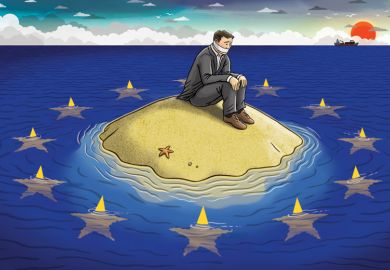It seems fitting that the number of sunshine hours that the UK enjoyed in June was well below average. For the 90 per cent of university staff reported to have supported the Remain campaign in the European Union referendum on 23 June, it was a particularly gloomy end to the month. For many, the future seems intellectually poorer, more insular and less well resourced.
In the immediate aftermath of the result, anxiety about the divisiveness of the campaigning was manifested in a popular meme showing Winnie-the-Pooh and Piglet in conversation about Brexit. Pooh voted Remain while Piglet voted Leave, but they reaffirm their friendship and plan to resolve their differences in the heart-warmingly British way: obliterating them with alcohol. Of course, it does not offer any solutions to the problems ahead, or offer a middle ground between the two camps. It just urges the reader to be nice.
Niceness is generally understood to mean being agreeable, polite and respectable. These are comfortable qualities to have in your colleagues. And, in a profession where eloquently offensive reviews are recorded with relish in the pages of prestigious journals, and where as many as 42 per cent of people experience bullying, this might seem like a good time for academics to take a page out of Pooh and Piglet’s book.
But I would rather take inspiration from another children’s character co-opted by Disney, Cinderella, whose narrative arc in the 2015 film version involves her striving to fulfil her mother’s injunction to “have courage and be kind”. Kindness is distinct from niceness. There is nothing particularly courageous about being nice: indeed, if it encourages us to sublimate our principles, it can be cowardly. It is easy to buy a coffee for and commiserate with a colleague who is overburdened with work and bullied by their head of department. But it is also easy to not challenge that head of department about their behaviour for the sake of not rocking the boat, and to thus be complicit in the toxic environment they’ve created. A senior scholar can easily be nice to a junior colleague by welcoming them to the department and writing an encouraging message in their leaving card when their latest short-term job contract comes to its inevitable end – without offering any tangible support in their search for their next post, and without writing to the vice-chancellor to ask why so many colleagues are on such precarious terms.
We often define kindness as meaning simply something like “demonstrating goodwill”. True kindness, however, is more robust than that. Unlike niceness, it does require bravery. It requires us to love our friends and colleagues with an active affection that promotes their interests. In a paper published in 2010 in the British Journal of Sociology of Education, Sue Clegg and Stephen Rowland argue that kindness goes unremarked and is threatened by current conditions in higher education – but also that a focus on it would aid resistance of the neoliberalisation of the modern university. In short, the paper, “Kindness in pedagogical practice and academic life”, argues that kindness can be a radical act.
In a post-Brexit world in which funding falls, jobs decline, pressure on departments increases and European academics find it harder to meet residency requirements, people will be victims of unkindness. They will be pushed to do more work than they can bear and told to feel grateful for it; they may also suffer even more than they already do on racist and sexist grounds. It will be easy to smile at them in the corridor and commiserate over their marking load – and these will be good things to do. But it will be harder to be kind: to step in where we see injustices, to speak up for each other, to make the time to find out how someone is really doing and what we can do to make it better.
It will be especially hard if we are victims of unkindness ourselves. And yet it is crucial that we all do kindness in our institutions: our activism begins with an outstretched hand.
Rachel Moss is a lecturer in late medieval history at Corpus Christi College, University of Oxford.
POSTSCRIPT:
Print headline: Radical acts of kindness
Register to continue
Why register?
- Registration is free and only takes a moment
- Once registered, you can read 3 articles a month
- Sign up for our newsletter
Subscribe
Or subscribe for unlimited access to:
- Unlimited access to news, views, insights & reviews
- Digital editions
- Digital access to THE’s university and college rankings analysis
Already registered or a current subscriber?







